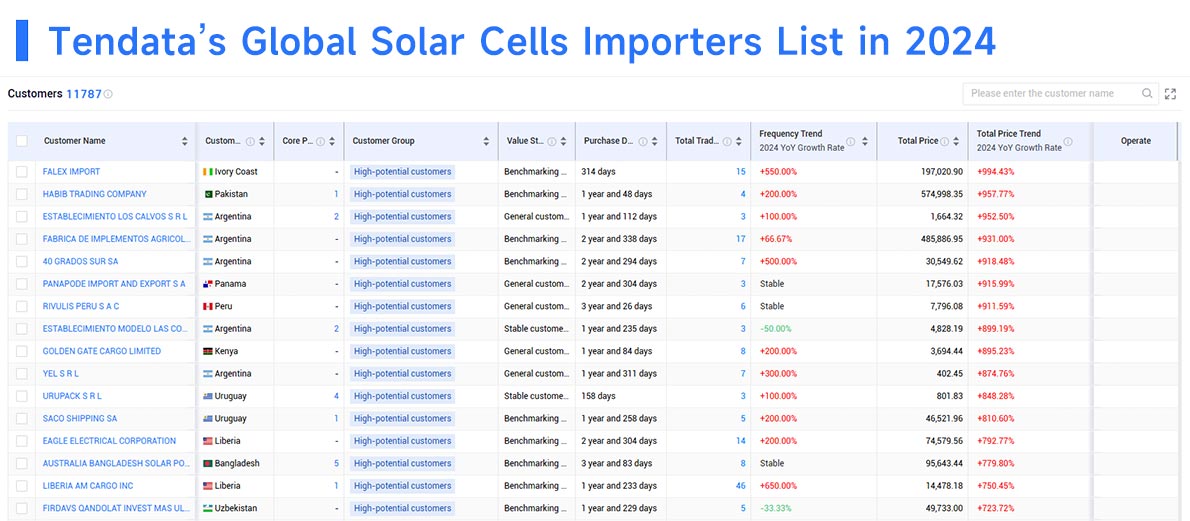 Trade Data Provider
Trade Data Provider
 2025-08-06
2025-08-06
In today's booming international trade, B2B platforms are an important bridge connecting global suppliers and buyers, providing many conveniences for foreign trade enterprises to expand their business. Below are some mainstream recommended B2B platforms for everyone:

In the foreign trade industry, B2B platforms have always been an important channel for enterprises to acquire customers, promote products, and open up markets. Here are some recommended B2B platforms that are currently mainstream and widely used:
Alibaba
The world's leading cross-border B2B e-commerce platform, covering over 200 countries and regions, with over 2 million registered merchants. The platform has a wide range of categories, from industrial products to consumer goods, and supports multilingual communication and online transactions, making it suitable for various foreign trade enterprises, especially small and medium-sized enterprises, to start.
Made-in-China
Focusing on 'Made in China', we have outstanding advantages in the field of industrial products and have a large number of high-quality supplier resources. The key markets are in Europe and America, and the platform review is relatively strict, which is suitable for manufacturers with certain strength to settle in.
Global Sources
Specializing in the combination of exhibitions and online platforms, high-quality buyers are mostly concentrated in developed countries such as North America and Europe.
Regional B2B platforms such as EC21, TradeIndia, DHgate, ECPlaza, etc
Each has its own segmented market advantages, suitable for selection based on product positioning.
Although B2B platforms are a commonly used customer acquisition channel for foreign trade enterprises, there are many drawbacks in actual operation:
1. Limited customer information makes it difficult to distinguish between true and false information
B2B platforms only display registered buyers, you cannot see real customers outside the platform. Customers often encounter invalid inquiries or unreliable buyers on their platforms, which poses risks to their transactions.
2. Intense platform competition
There are many sellers on the platform, severe homogenization, high advertising costs, and low profits.
3. Lack of market analysis
B2B platforms will not tell you which country imports more and which products are selling well.
4. Unable to track competitors
You don't know who your peers are exporting to, nor do you know which country they are doing well in.
In contrast, the advantages of Trade data are very obvious:
1. Accurately connect with customers
Trade data records specific import and export transactions. Enterprises can find customers who purchase specific products by viewing the buyer's purchasing category, frequency, quantity, and historical suppliers. They can directly establish contact with customers and develop targeted pricing strategies to improve transaction rates, grasp market trends, and discover new opportunities
2. Analyze import data from various countries to grasp product trends and market potential.
Trade data can help you analyze the import volume, growth rate, and seasonal changes of a product in different countries, discover which markets are growing and which products are being heavily purchased, and thus plan ahead to seize business opportunities.
3. Track the trends of peers and lay out the market in advance
You can track competitors' export countries, customer names, frequency, and transaction amounts through data, and grasp their main markets and customer groups. This helps identify market gaps that they have overlooked and develop more precise competitive strategies.
4. Verify customer background, reduce transaction risks, and cover a wider range of customer resources
The trade data collection is based on the real import and export trade records of each country. You can view detailed information such as the company name, address, transaction frequency, customer purchase volume, purchase cycle, past cooperative suppliers, and purchase price range of global importers. Enterprises can comprehensively grasp customer situations, develop personalized cooperation plans, and reduce trade risks.
>>Get a free demo from Tendata<<

Among numerous Trade data platforms, Tendata has become the preferred choice for foreign trade enterprises due to its outstanding performance and high-quality services.Tendata provides trade data resources covering 228 countries and regions worldwide, with a cumulative collection of over 10 billion trade transaction details. Users only need to input product keywords or HS codes to quickly obtain tens of thousands of import and export enterprises with real procurement or supply records latest.
Through import export data, enterprises can analyze the import and export activities of various countries around the world and grasp global market changes. Taking the electronic watch (HS code: 9102190000) as an example, through Tendata, companies can easily obtain the import and export records of electronic watches in 2024, including supplier’s names, transaction amounts, product quantities, import frequencies, etc.
Tendata updates its data in real-time, providing the latest international trade trends. Enterprises can obtain the latest market information at any time to maintain competitiveness.
Category
Leave Message for Demo Request or Questions


 T-info
T-info T-discovery
T-discovery

 My
Tendata
My
Tendata Market Analysis
Market Analysis Customer
Development
Customer
Development Competitor
Monitoring
Competitor
Monitoring Customer Relationship
Customer Relationship





































































































































